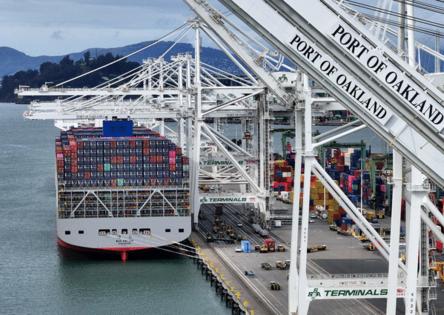Trump puts Mexico tariff plan on hold after deal reached, stock markets rebound
Published in News & Features
President Donald Trump Monday put his plan for 25% tariffs on all imports from Mexico on hold for a month after a productive discussion with Mexican president Claudia Sheinbaum, and later made a similar deal with Canada.
“(We) agreed to immediately pause the anticipated tariffs for a one month period during which we will have negotiations … as we attempt to achieve a ‘deal’ between our two countries,” Trump wrote on his social media site, describing the 30-minute chat as “very friendly.”
Markets rebounded sharply as investors bet that Trump’s bark may be worse than his bite on tariffs.
Sheinbaum said Mexico agreed to send 10,000 troops to its border with the U.S. to help stem the flow of undocumented immigrants and battle drug trafficking.
Canadian Prime Minister Justin Trudeau reached a similar deal with Trump later in the afternoon, also averting the huge tax that would send prices skyrocketing for American consumers on a wide range or products.
Trump also has vowed to impose a 10% tariff on imports from China effective Tuesday. That tax was still expected to go into effect.
The White House has not explained why it planned to impose a much heftier tax on imports from America’s allies and close trading partners than its main global economic rival.
Markets bounced back sharply on news of the deal with Mexico after plunging sharply at the opening bell.
House Democratic Leader Rep. Hakeem Jeffries denounced the tariffs as part of what he called a “Republican rip-off” that would only hurt everyday Americans.
“The tariffs that have been imposed or threatened will raise the price of food in America, raise gas prices in America and raise the cost of purchasing a car in the United States of America,” Jeffries said at a Brooklyn press conference.
If they do happen, tariffs against Canada would likely see gasoline prices increase sharply at the pump, especially in the Midwest where Canadian crude oil makes up a large share of refined petroleum products than elsewhere.
New car prices would be expected to jump significantly because automakers have closely integrated assembly lines in Canada and Mexico into their supply chains.
If Trump eventually does impose tariffs on Mexico, consumers could expect to see sharply higher prices for produce, beer, tequila and household appliances, many of which are made south of the border.
The tariffs on China imports would affect a broad basket of American consumer goods because so many of the things American families buy are made in Chinese factories.
China is the world’s manufacturing powerhouse and is better able to absorb the shock of tariffs because it sends a smaller share of its products to the U.S., compared to Canada and especially Mexico.
Trump says tariffs will incentivize companies to move manufacturing to the U.S. but economists say that’s unlikely.
He also claims the taxes will be shouldered by the foreign governments or producers but history says firms pass on the costs to American consumers.
_____
©2025 New York Daily News. Visit nydailynews.com. Distributed by Tribune Content Agency, LLC.







Comments